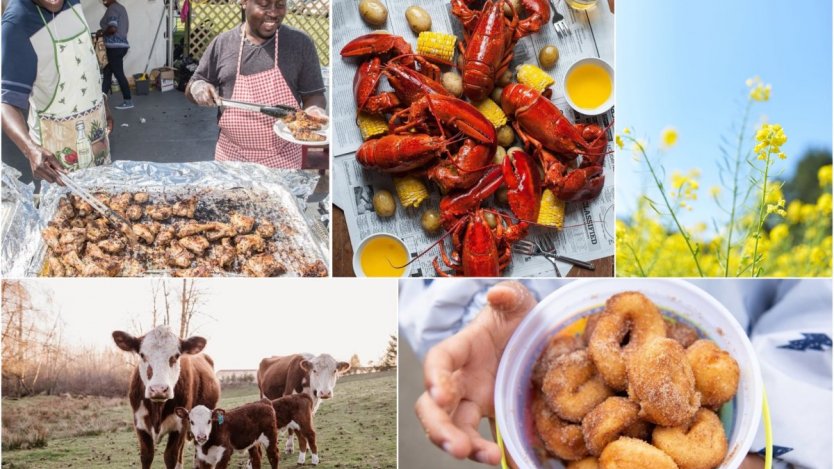Although Calgarians will not be able to flock to the Stampede grounds this year to ride the midway, they can still enjoy the food that the Calgary Stampede is famous for with a different setup.
Another iconic festival is trying to work its way through the pandemic without abandoning it all together. Edmonton's Heritage Festival is using an online platform to celebrate this year, while promoting lesser known local restaurants.
Over on the East Coast, Nova Scotian lobster producers are being put under the spotlight after the industry in China demanded that Canadian shippers sign liability forms.
As traditional proteins go out of style from preferences for diets such as vegetarianism, there is an ever-growing demand for alternative proteins. The federal government has provided $100 million to grow the pea and canola protein industry with a new production plant in Winnipeg.
Those who steer clear of pea protein and stick to beef may have noticed a bit of sticker shock over the past few weeks, as prices have skyrocketed due to supply chain disruptions and increased demand.
In Iqaluit, after a three-year trial period, the territory has now be given the go ahead for the Iqaluit Beer and Wine Store to become a permanent fixture.
The Calgary Stampede grounds to open for drive-thru treats
Although COVID-19 stomped out all hope of Calgary holding The Greatest Outdoor Show on Earth, that doesn't mean that people can't enjoy its famous midway snacks. It was announced that there will be a handful of events around the city for those wishing to indulge in Stampede staples, like mini donuts and pancake breakfast.
Stampede Park will open its doors for a mini donut drive-thru, BMO's Kids' Day Pancake Drive-Thru Breakfast and the Stampede Food Truck Rally.
The Calgary Stampede is encouraging Calgarians to get in the country spirit, put on their cowboy hats and flannel shirts and enjoy their carnival eats on their front lawns.
Read more about this and the event details from the Calgary Herald.
Edmonton's Heritage Festival goes digital to support local restaurants
Although Edmonton's yearly Heritage Festival was cancelled due to COVID-19, the organizers are pushing for the festival to be brought back to life with digital tools. It won't look the same as last year though. Instead, the organizers are pivoting to a month-long festival instead of its usual three days with a range of offerings from restaurants of different cultures.
Initially, the festival organizers planned to get people to order food online through their website, then pick it up through a drive-thru service, but the initiative failed to get government approval.
The festival will be featuring some lesser known restaurants on their website, to give local businesses the boost they need in these times. They will be releasing more information on July 1st about which restaurants are involved and how it will be executed.
Read more about this from the CBC.
Nova Scotia's Lobster industry clashes with China
This week, Nova Scotian lobster shippers were faced with new roadblocks when it comes to shipping products to China.
Following a COVID-19 outbreak from Atlantic salmon at a Beijing food market, traced back to a cutting board, customers from China are demanding Canadian shippers to sign a declaration their lobster is free of COVID-19.
The industry was worth $457 million in 2019, so the loss of this export could be fatal to the industry, but shippers are concerned about the testing period due to the volatile nature of shipping live lobster. Due to the 36-hour waiting period of receiving COVID-19 tests back on shipments that come into China, some Nova Scotia companies opted to cancel their shipments, as to not risk the lobsters perishing before the product can even get to market.
In addition to the risk of losing valuable product, exporting companies are also being demanded to sign a liability waiver, which would hold them accountable if COVID-19 was detected on the shipment. This decision combined with the aforementioned testing situation, has caused upset on both sides of the equation. The Canadian government has not yet stated an official position on the topic, saying that it is an industry-to-industry matter.
Read more about this dispute from CBC and its related story.
Federal government puts $100 million towards pea and canola protein
As alternative diets like veganism and vegetarianism are on the rise, people are looking to find sources of protein that don't come from meat. Due to this rising interest in alternate forms of protein, the federal government launched an initiative to up the production of protein powder out of peas and canola. Merit Functional Foods Corporation will be receiving $100 million toward a brand new 94,000-square-foot facility, scheduled to be operational before the end of this year.
Prime Minister Justin Trudeau noted that this facility will be a leader in the industry, in addition to providing jobs in a rapidly growing market. This news is especially timely and interesting, as McDonald’s confirmed this week that its six-month trial run of the Beyond Meat plant-based burger has ended and it has no plans for adding a plant-based option on the menu.
Read more about the new plant protein program from Global News and the news about McDonald’s trial with Beyond Meat from CBC.
Beef prices at an all time high, but not for long
If you have noticed that your weekly shop has gotten a little pricier lately, you are not alone. Those purchasing meat products have seen prices skyrocket in the past few weeks. But, meatatarians rejoice, these sky high prices are predicted to come back down as early as next week.
The Canadian supply chain of beef was hit hard by COVID-19, with production plant outbreaks and other struggles reducing the amount of beef they could provide to stores. The two meat processing plants in Alberta that experienced outbreaks accounted for 70 per cent of the Canadian beef processing industry, leaving a massive gap in the supply chain. In addition to this, panic buying by consumers was also to blame.
Read more about this news from CTV.
The Iqaluit Beer and Wine Store receives the go-ahead to stay open
The Iqaluit Beer and Wine Store has gotten the green light to remain open after its three-year trial period. Created with the aim of reducing the consumption of hard alcohol and to decrease bootlegging, the initiative drove a reduction in alcohol purchases from bootleggers and less money spent on alcohol consumption, according to a survey by Nunavut Liquor and Cannabis Commission.
Read more about this from the CBC.













